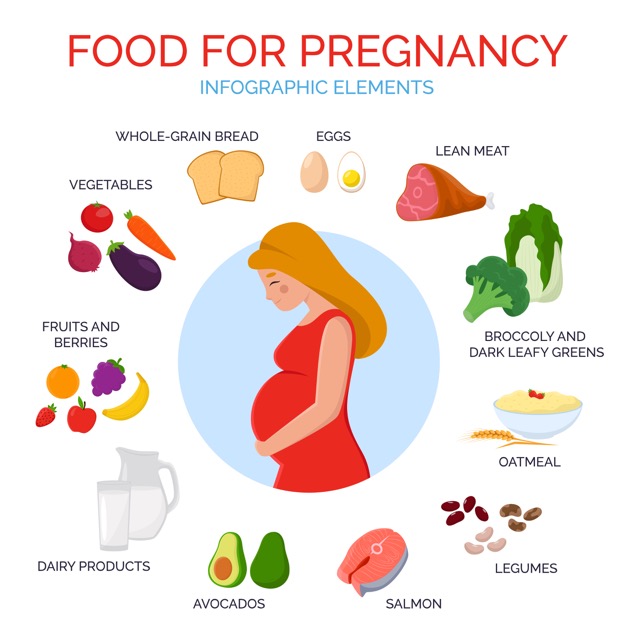What to Eat During Pregnancy: A Guide to Healthy Nutrition

Proper nutrition during pregnancy is essential for the health of both the mother and the baby. A well-balanced diet provides the necessary nutrients for fetal growth and development while keeping the mother healthy. Here’s a guide on what to eat during pregnancy.
Essential Nutrients for Pregnancy
1. Folic Acid (Vitamin B9)
Folic acid is crucial for preventing neural tube defects in the baby.
Sources: Leafy greens, citrus fruits, beans, fortified cereals, and lentils.
2. Iron
Iron supports the increased blood volume during pregnancy and prevents anemia.
Sources: Lean meats, spinach, legumes, fortified grains, and nuts.
Tip: Pair iron-rich foods with vitamin C sources (like oranges) to enhance absorption.
3. Calcium
Calcium is essential for the baby’s bone and teeth development.
Sources: Dairy products, tofu, almonds, green leafy vegetables, and fortified plant-based milk.
4. Protein
Protein is vital for fetal growth and the development of organs and tissues.
Sources: Lean meats, eggs, fish, dairy, beans, nuts, and soy products.
5. Omega-3 Fatty Acids
Omega-3s help in brain and eye development.
Sources: Fatty fish (like salmon), walnuts, chia seeds, and flaxseeds.
6. Fiber
Fiber aids digestion and prevents constipation, which is common during pregnancy.
Sources: Whole grains, fruits, vegetables, beans, and lentils.
7. Hydration
Staying hydrated is crucial to support increased blood circulation and amniotic fluid levels.
Tip: Drink at least 8-10 glasses of water daily and include hydrating foods like cucumbers and watermelon.

Foods to Avoid During Pregnancy
Raw or Undercooked Meat & Eggs: Risk of bacterial infections like salmonella and listeria.
High-Mercury Fish: Avoid shark, swordfish, and king mackerel.
Unpasteurized Dairy & Juices: Can contain harmful bacteria.
Excess Caffeine: Limit to 200 mg per day (about one cup of coffee).
Processed & Junk Foods: High in unhealthy fats, salt, and sugar.
Healthy eating tips for pregnant woman
Eat small, frequent meals to manage nausea and maintain energy.
Include a variety of food groups for a balanced diet.
Take prenatal vitamins as recommended by your doctor.
Listen to your body’s hunger and fullness cues.
Eating a nutrient-rich diet during pregnancy ensures a healthy pregnancy journey for both mother and baby. Focus on whole, unprocessed foods and consult your healthcare provider for personalized dietary advice. By making smart food choices, you can support your baby’s development and maintain your own well-being.
Have any pregnancy nutrition tips or experiences to share? Let us know in the comments below!
